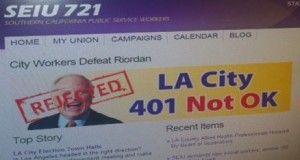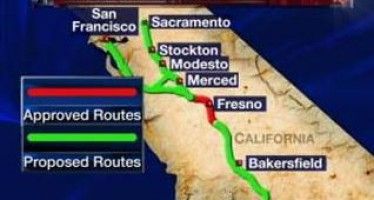The union assault — covert and overt — on direct democracy
Nov. 30, 2012
By Chris Reed
For decades, signature-gathering to win placement of measures on the local or state ballot in California has followed a basic script. Once proponents gathered some 30 percent more signatures than the minimum threshold necessary, they shut down operations, confident that their measure would easily make the ballot.

But in the past three years, this script has been rewritten, at least when it comes to measures that threaten the interests of public employee unions or that target their supporters. This new norm amounts to a brazen and illegal union assault on direct democracy, which in California is the most significant check on their hegemony.
In November 2009, an attempt to recall Assemblyman Anthony Adams, R-Claremont, never made the ballot even though proponents turned in 58,384 signatures –- 63 percent more than the 35,825 necessary to force a vote on whether Adams should be ousted. A random sample of 1,839 ballots had shown only 42 percent were valid.
Adams was a darling of unions for providing a decisive vote in the Legislature in February 2009 for $12.8 billion in higher income, sales and vehicle taxes, breaking past promises to his constituents. This led KFI 640 AM’s powerful radio hosts, John Kobylt and Ken Chiampou, to push for a recall.
In July 2010, a proposed initiative to force the outsourcing of more government services by the San Diego city government faced a similarly mysterious demise. Proponents, led by San Diego Councilman Carl DeMaio, turned in 134,441 signatures -– 39 percent more than the 96,834 needed. But a random sample of 3 percent of signatures showed so many duplicate signatures and ineligible signers that officials estimated only 74,732 were valid.
In July 2011, a proposed initiative that would have changed the makeup of the San Diego Unified school board and likely weakened the local teachers union’s control of the board also failed. San Diegans 4 Great Schools turned in 129,283 signatures –- 39 percent more than the 93,085 needed. But a full hand count found that just 90,027 were valid –- with a stunning 11.4 percent of the signatures being duplicates.
A leader of San Diegans 4 Great Schools expressed bafflement at this “aberration.” But in San Diego political circles, it was accepted as a given that local union members had monkey-wrenched both the 2010 and 2011 initiatives.
Now, thanks to the just-aborted attempt by former Los Angeles Mayor Richard Riordan to bring sweeping pension reform to the city of Los Angeles, unions have lost any plausible deniability. Two weeks ago, Paul Kim, a work-site organizer for Service Employees International Union Local 721 in Los Angeles, sent out an email to SEIU members with this admonition:
“We need Union members hitting the streets signing Riordan’s petition with fake names/addresses and gathering retraction signatures from LA residents on our own petition. We need people power starting this Saturday.”
On Nov. 20, after reports on the attempt to illegally manipulate the signature-gathering process, SEIU leaders quickly disavowed Kim’s email and declared it a “non-issue.”
But given that Kim was rebuked by the SEIU only after his email became known to the media, it was hardly a persuasive disavowal. And to proponents of the measure, it was hardly a “non-issue.” On Monday, Riordan dropped his push for pension change, saying he no longer believed he could meet the Dec. 28 deadline he had set to gather 265,000 valid signatures –- even though public sentiment in favor of pension reductions is strong.
Yet the Los Angeles Times’ article announcing Riordan’s decision didn’t even mention the SEIU email. And since then, there’s been scant follow-up on the Kim email or any effort by the mainstream media to connect the dots between what happened with the Adams recall, the San Diego outsourcing and school board petition drives, and the SEIU plot in Los Angeles.
Meanwhile, in Sacramento, Senate President Darrell Steinberg is proposing to use Democrats’ new “supermajority” status to pursue initiative “reforms” that would potentially let the Legislature tinker with the wording and intent of ballot measures and have some sunset after 10 or so years. This has won praise from the usual suspects, starting with the Times’ George Skelton.
Public employee unions have used their power to shape life in California for so long that students of the Golden State have grown to accept it as a given. But union critics at least have had the solace of knowing that direct democracy would always provide an avenue for the public to have its wishes honored.
Now, however, direct democracy itself is in the union cross hairs, both openly and covertly, and one key tactic involves flagrantly illegal behavior. Nothing could make it more obvious that in California, union power has metastasized into something more akin to organized crime than organized labor –- or at least our old conception of organized labor.
It is still possible for direct democracy to succeed, as it did in San Diego in June with the passage of a massive pension overhaul. But that was only because those guiding the well-financed push for signatures for the measure committed early on to verify every signature before turning in ballot petitions — a vastly more costly and time-consuming process than the old practice of just turning in 30 percent more signatures than necessary.
Yet even the San Diego measure is imperiled because of an extraordinary effort by the state Public Employment Relations Board to have it thrown out in court for purportedly violating collective bargaining rights of public employees.
It’s plain that unions and their allies will do literally anything to maintain their chokehold on California’s local and state governments.
Related Articles
Attack of the artificial crises
March 25, 2013 By Steven Greenhut SACRAMENTO — Not many of my friends or neighbors are sitting on pins and needles,
Will appeals court notice AG’s flip-flop on bullet train?
It took the California Supreme Court five days to unanimously reject Gov. Jerry Brown’s request that justices immediately consider a
Did the bullet train die in sequester fallout? Maybe. (Hallelujah!)
March 10, 2013 By Chris Reed The fallout of the sequester continues to be widely discussed, with the conventional wisdom



